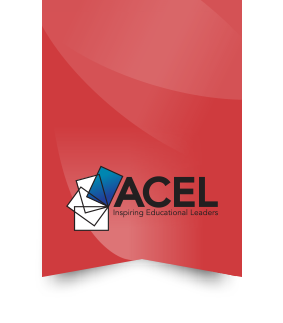
Perspectives
Do Principals Need to be Educators First?
There is a clear and articulated expectation that principals are highly skilled managers and leaders of their schools, but what of the need to be a highly skilled educator, or in fact an educator at all? Does a principal need to have the hands-on knowledge of a teacher to successfully lead a school? Perspectives will challenge us to consider traditional and changing visions of leadership in schools.
In this edition of Perspectives, Greg Whitby, Coralee Pratt and Scott Eacott will provide their perspective on “Do Principals Need to be Educators First?”
Greg Whitby
Executive Director of Schools
Catholic Education Diocese of Parramatta

Next Generation Schooling Requires Next Generational Leadership
Opening in 2017, St Luke’s Catholic College at Marsden Park in Western Sydney will represent the best of Catholic Education Diocese of Parramatta thinking on providing schooling for today’s learners, within a Catholic faith environment. It brings together the best theory, practice and evidence on how you can improve the learning of each child and build a highly skilled teaching profession. While the school services the local community it will establish: global connections and work in partnership with other schools, the tertiary sector and the business community in providing not only multiple and diverse pathways to learning but also developing the entrepreneurial skills needed to shape employment opportunities into the future.
This school and others like it need to respond to the changing needs of learners and the changing times in which we live. These schools challenge the current industrial constructs for delivering schooling by embracing constructs suited to the knowledge age and a knowledge economy. This means that constructs like K-6 and 7-12 are replaced by a construct that sees schooling as a continuum from the early years of schooling through to opportunities to not only exit but re-enter the school. This will be a true pre to post planning framework.
It will focus on collaboration not isolation; integration not segregation and learning and teaching will be personalised not programmatic. It demands that we think outside the square to unpick many of the traditional staples ingrained in daily school life to reimagine schooling in a 21st century context. At the heart of our planning is the understanding that learning and teaching is about knowledge work, not an industrial process.
An Artisan Approach to Education
Despite the rapid pace of social change, including the nature of paid employment and digital disruption, many schools too closely resemble those of the past. ‘Old school’ values like conformity, compliance, discipline, obedience and uniformity still prevail in many educational institutions. They are the values of a past era, where the uniforms and bell times of the classroom prepared future workers for the uniforms and bell times of the factory.
‘Old school’ education served its purpose, back in the day. But when the workforce increasingly needs entrepreneurs, innovators and ideas people, it is time to move away from a one-size-fits-all model. A ‘new school’ education has a more artisan approach, recognising students’ individual strengths and providing genuine personalised learning. It responds to the dynamism of a modern context, preparing students to meet challenges so far unimagined.
In recognition that teachers are knowledge workers it is a time they are valued for their intellectual property, the construction of meaningful, deep and rich learning experiences for the students in their care.
Technology is Here to Stay
It seems that as soon as we start to discuss new models for schooling, the education sector inevitably divides into two camps: the ‘traditionalists’ and the ‘contemporaries’. This has been no more evident than recent debate over technology in classrooms where some high schools have denounced the use of computers in the classroom as a ‘distraction’ gaining significant support from proponents of the ‘good old days’ of learning and teaching.
Technology in the 21st century must not be an either/or proposition - it is the environment in which we live. The sooner we accept and explore technology as a tool to enable and enrich great learning and teaching, the better. In fact, the 2015 OECD report into Students, Computers and Learning stated that ‘connections among students, computers and learning are neither simple or hardwired; and the real contributions ICT can make to teaching and learning have yet to be fully realised and exploited’. It goes on to say that ‘to deliver on the promises technology holds, countries need a convincing strategy to build teachers’ capacity’.
At a recent conference in Singapore, the Singaporean acting Education Minister, Ng Chee Meng echoed this stance. As one of the top performing nations on international measures (Singapore topped the OECD global educational ranking in 2015) Mr Ng said his nation’s future success relies on the possibilities that Technologies bring to learning and teaching, not the topping of international rankings.
Leading is Critical to Success
Learning is about context, connections and metacognition (Bransford et al, How People Learn) and it is about understanding the cultural forces at work to invest in a relevant and engaging education that places students at the centre of their own learning. We need leaders who understand this radical shift.
As the nature of the work changes, it is imperative that schools have strong leaders who are excited by the challenge of transforming learning and teaching. Leaders who will lead a culture of change and innovation. Leaders who can ask the important questions about the transformation possibilities of technology and big data on learning and teaching.
What makes a next generation leader?
Leaders who are prepared to go out on the edge, leaders who are prepared to test the theory and the practice, leaders who argue the proposition and lead change in a sustainable way. It’s not about the answers, it’s about the powerful questions needed to design these new learning communities. Given that there is no one size fits all we need leaders who can live with diversity and continual change, because to change is to grow.
Next generation leading requires an entrepreneurial approach – it requires looking beyond the next five years; seeing the infinite possibilities and making it happen. Being able to lead by example, to lead by doing, to lead by learning, to lead by teaching are just some of the hallmarks of 21st leaders. As Wayne Gretzky, Canada’s most famous ice hockey player, observed when asked about his success, he responded that he never sought to go to where the puck is but to where it will be.
Recently, Australia’s oldest independent school, The King’s School, appointed a new principal with an MBA and just a few years experience as a classroom teacher. To some this may seem like a radical departure for the career teacher working their way up through the ranks of coordinator, AP and Principal. The nature of education is changing and so too must the role of teachers and school leaders. Looking to school leaders who also have private sector management experience and other relevant expertise makes sense.
Today’s school and community leaders need a different skillset to the managerial or administrative skillset that defined their role in the past. A contemporary skillset includes creativity, collaboration, curiosity, adaptability and problem-solving. A ‘new school’ leader must be an outstanding communicator, make connections and manage relationships, be an entrepreneur and willing transform, not just improve, his or her community.
St Luke’s is not the school of the future. Nobody knows what the future will look like. What we need to do is build the school for today that understands that the future will be different and is therefore open to adapt and change. Ultimately as a profession, we need to learn the future - and that’s the exciting part of the work we do.
References
Branford, J, Brown, A and Cocking, R, (2004). How People Learn: Brain, Mind, Experience and School, National Academy Press, Washington.
Darling-Hammond, L (2010). The flat world and education, Teachers College, Columbia University, New York and London.
OECD. (2015). Students, Computers and Learning: Making the Connection, PISA, OECD Publishing, Paris.
.
Perspectives
Coralee Pratt
 Senior Education Improvement Leader – Outer East North-Eastern Victoria Region
Senior Education Improvement Leader – Outer East North-Eastern Victoria Region
Department of Education and Training
M. Ed; B. Ed; Grad.Dip. Early Childhood Teaching; FACEL
Do Principals Need to be Educators First?
Any organisation can be managed by someone with appropriate managerial expertise, however for that organisation to be highly effective and continuously improving, going from what Jim Collins cites as ‘good to great’, the leader must possess a specific skill set and contemporary knowledge base. Imagine a Bank Manager having low level financial skills or lacking basic business acumen. Processes may be followed, staff accountability and performance tracked, but decisions may be poor, lack specific understanding and have significant financial consequences.
If we accept the notion of schools being learning organisations where continuous learning is central and everyone in the school community is acknowledged as a learner, then the implication is that the person leading the school, the principal, is the leader of the learning. To be the ‘lead learner’ principals must have: deep understanding of metacognitive processes; articulate and model the instructional model; understand that learning is a process and use and model self-reflection processes.
Recent reports that suggest school boards and education systems may employ managers from outside the education sector as school principals. This is a concept fraught with danger and sends a precarious message to the broader community.
There is no argument that the principal’s role in contemporary society has changed. It is diverse and complex, and responding to an era which is subject to rapid change, new technologies and global complexity.
Whilst it is acknowledged that the principal role now incorporates many important managerial competencies as well as a range of other new skills such as: partnership connection and development; counselling, and something now being considered essential, entrepreneurship. The principal’s key priority must continue to be building the capacity of their teaching staff to improve student learning.
To do this effectively principals must be educators first and have the specific skills to design and implement integrated, whole school approaches to pedagogy, understand a targeted teaching approach to ensure differentiation in classrooms and lead teacher learning within their school. The degree of direct involvement may vary according to the size of the school setting but the degree of influence should be the same, and is crucial.
The educational community is constantly reminded that what happens inside a classroom is what will have the greatest impact on student’s learning and indeed school and system improvement (Fullan, M. 2016: Elmore, R. 2009: Hattie, J. 2015) This is where the principal plays a critical role in leading the professional learning agenda at their school, ensuring it is predominantly school based and managed, utilising internal and local expertise as much as possible, employing research informed best practices, collaborative in nature and based on evidence.
I am not suggesting that the principal’s role is to micro-manage, but rather to collaboratively monitor teacher practice and student achievement through leading the development of a professional learning community. This is skilful work and the function of an educational leader, not a manager.
Once inside the classroom, the manager has a very different lens to that of the educator who would be looking for evidence of agreed high impact professional practices being utilised in that learning environment: effective differentiated planning, use of developmental continua and assessment against standards, just to name a few. This specialised knowledge enables the principal to develop an accurate understanding and tell a story so as to lead and shift practices being implemented in all classrooms in their school, engaging all members of their professional learning community.
Education systems globally have heighted expectations of principals as leaders of learning in their school communities. Using Victoria and the ‘Education State’ agenda as an example, a rigorous improvement agenda has been created, which at the centre is the Framework for Improving Student Outcomes (FISO). This model identifies four statewide priorities: excellence in teaching and learning; community engagement in learning; professional leadership; positive climate for learning. All Victorian schools are currently using this framework within their communities to lead strategic planning, pedagogical change and resource allocation. With “learning” as central, only an educational leader can lead the school community in identifying current practice, where the gaps and opportunities for improvement exist and how to align this to the FISO.
In conclusion, managers from outside the profession will not save the day no matter how charismatic, or experienced in management. We need principals who are educators first and foremost because they:
- Understand how the learning agenda works both in terms of classroom practice and adult learning.
- Are best qualified to identify and value internal talent and expertise, thus growing more sustainable capacity in their professional learning community.
- Have the skills in leading meaningful conversations focused on a range of student data and linking this to learning strategies requires specific teaching and learning knowledge.
- Have the credibility to provide meaningful feedback to teaching practitioners on an individual basis.
- Have the professional trust and credibility to support teachers who face heightened performance expectations.
- Can ‘talk the walk’ having the credentials and experience to do so.
Perspectives
Scott Eacott
 Office of Educational Leadership, School of Education, University of New South Wales
Office of Educational Leadership, School of Education, University of New South Wales
Do Principals Need to be Educators First?
There is little doubt that the role of the principal has changed. The school-level responsibilities of the principalship have increased, so too the accountabilities, but surprisingly the path to the position has remained relatively unchanged. Steps are incremental up the organisational hierarchy from the classroom through the co-ordinator, assistant / deputy roles before finally reaching the highest school-based position – the principalship. Yet the principalship for the most part is non-teaching and involves considerable business and political acumen.
Calls for principals to have business skills are not new. Raymond E Callahan’s classic Education and the Cult of Efficiency persuasively argued how business practices came to dominate educational administration (as it was known then) during the first half of the 20th century. But at what point do the non-education skills become equal to or more important than educational knowledge and skills?
Australia has been a leading adopter of managerialist approaches to schooling. Despite inconsistent empirical evidence, policy at all levels continues to push for greater school-level management. Trends such as a national curriculum, professional standards and increasing prescription of teacher education courses all contribute to a standardisation of education. Tightening fiscal conditions also mean that educators are competing for a small pool of funds and alternate sources and uses of income are frequent.
The current spread of the work of John Hattie through professional associations, systems, and schools is a significant factor here. The cherry-picking of his Visible Learning work (assuming you accept all of its limitations) makes it possible to identify the educational practices with the greatest return on investment. A somewhat logical conclusion is that schools simply need principals who can facilitate, or focus, the work of educators on these high return practices. Combined with balancing the books and keeping community members happy, that is arguably what is expected of the contemporary principal.
This brings us to the question: Do principals need to be educators first? My response is absolutely they do. As Sun Tzu argued some 3,000 years ago:
All men can see the tactics whereby I conquer, but what none can see is the strategy out of which great victory is evolved.
I am not suggesting that education is like a military campaign – as that is as equally problematic as a business argument – but educating is specialist work. To make this argument I want to parallel with the practice of teaching.
Lee Shulman’s work on pedagogical content knowledge is significant. Shulman’s argument is that teaching is neither disciplinary content knowledge (subject knowledge) nor pedagogical knowledge (how to teach). Instead, it is the purposeful combination of the two. Without the two, serious educational questions are left unasked in preference for technical ones. In short, educators are reduced to mere technicians – the kind that we are constantly told will be replaced by robots in the not too distant future.
This same matter crosses over to the principalship. Unlike the UK which has retained the title ‘headteacher’ for the head of a school, the principal is not necessarily an educator. This is at the heart of the problem. What do we expect of the head of a school?
I have never attended a conference or taught a class where the primary purpose of the principalship has been reduced to making efficient decisions. While I do not deny the realities of running what can often be a relatively large size organisation, and these are complex, but context is important. Without a depth and breadth of educational knowledge, educational decisions cannot really be thought through and made in the best interests of students. I argue that this is why principals need to be educators first. A principal’s grounding in education content knowledge is what enables decisions to consider the educational implications. This comes from a quality initial teacher education program, experience in schools and an ongoing commitment to continual professional learning.
If the principalship is no-longer about education, then education has already lost. Not just the battle, but the war. The reduction to a set of generic management competencies devoid of any educational grounding would reduce schooling to a training ground for political masters. These are not new arguments but ongoing struggles.
In the interests of advancing education it is vital that the central decision making role in the school – the principalship – sustains its educational roots. Anyone can make decisions to achieve greater efficiencies, but the collateral damage of such decisions may be overlooked without educational content knowledge. While I am not saying that educators are the only people capable of making decisions to do with education, I am arguing that educational decisions require working knowledge of educating. Our nation, its schools, and most importantly our children, deserve such.